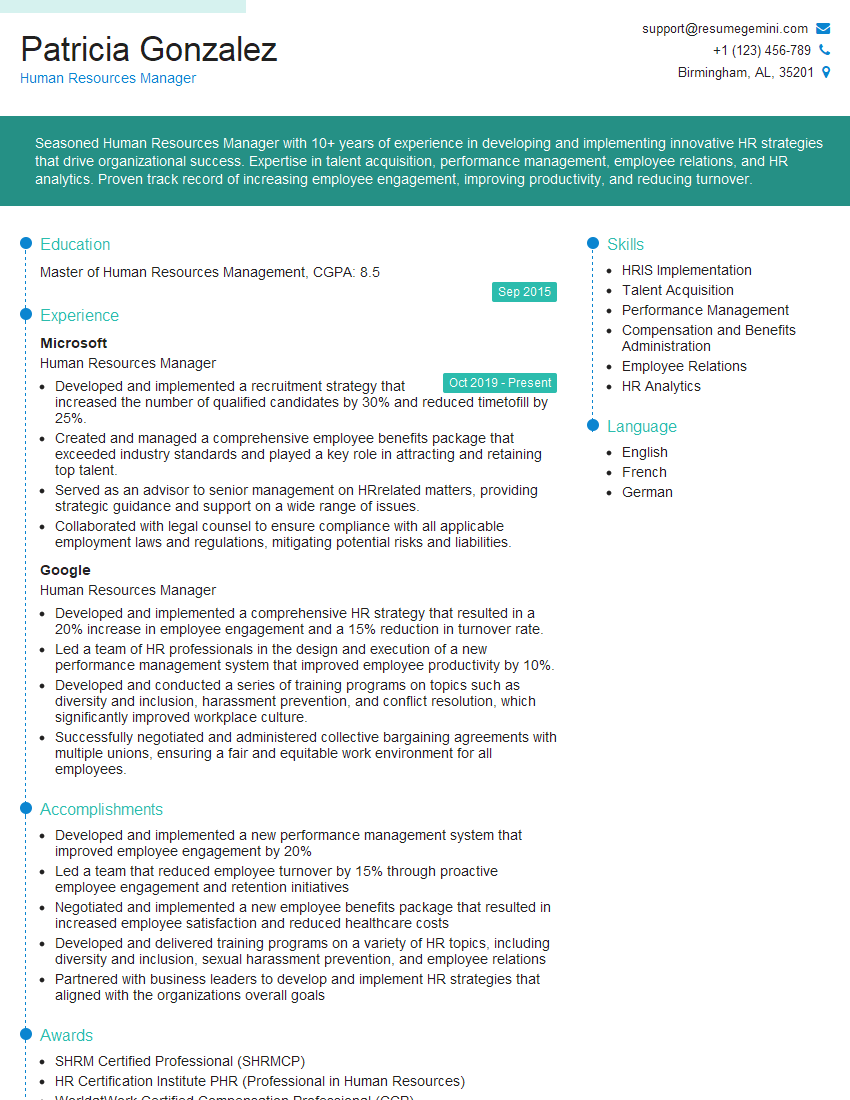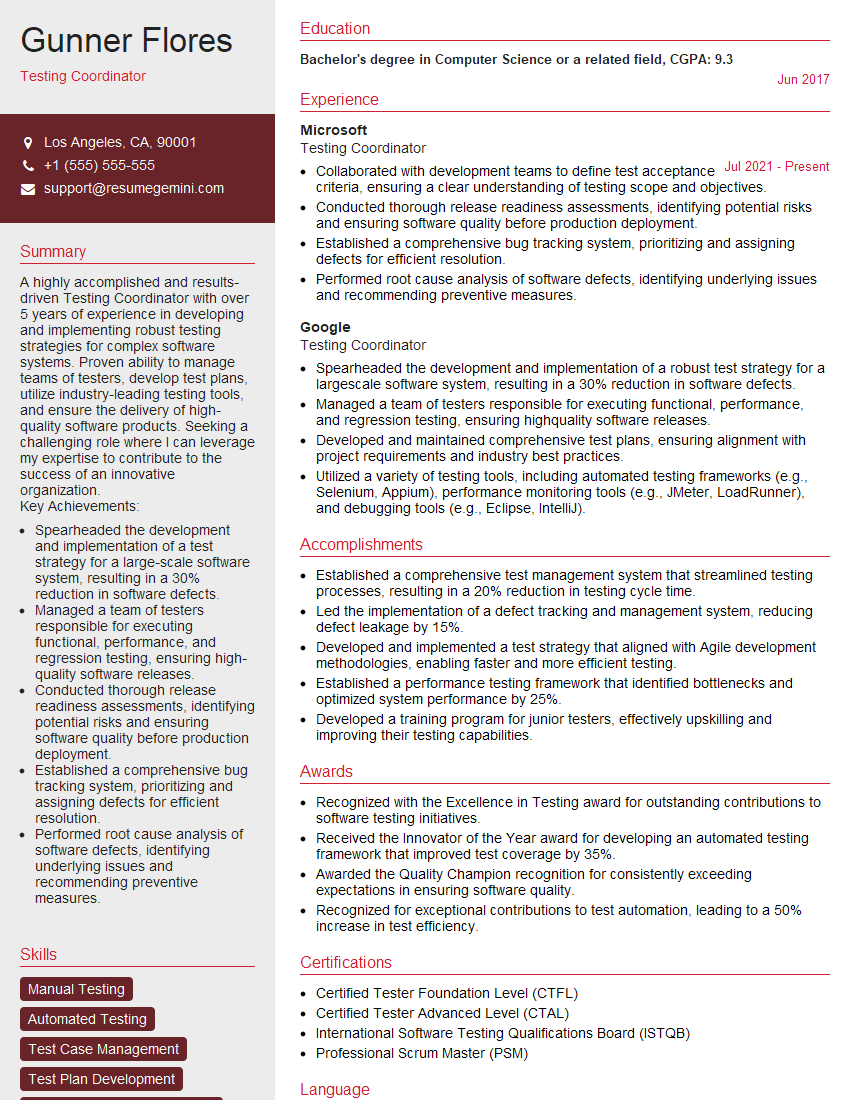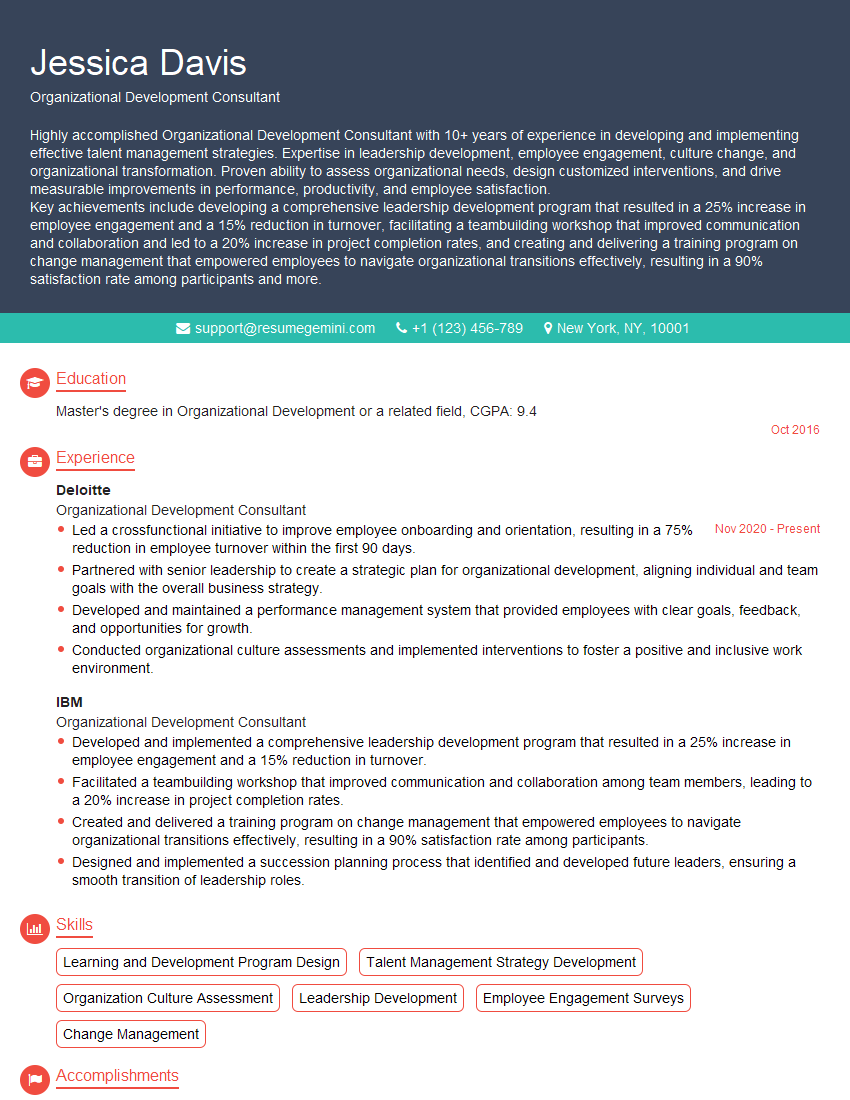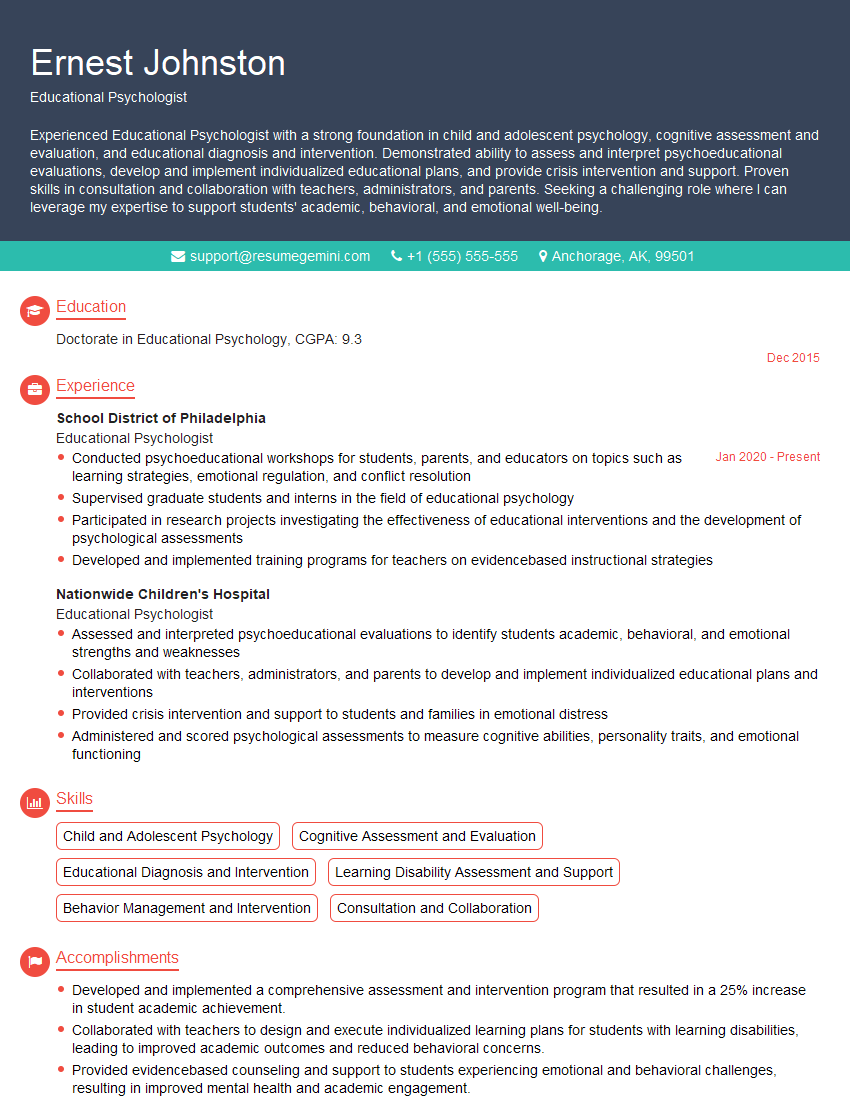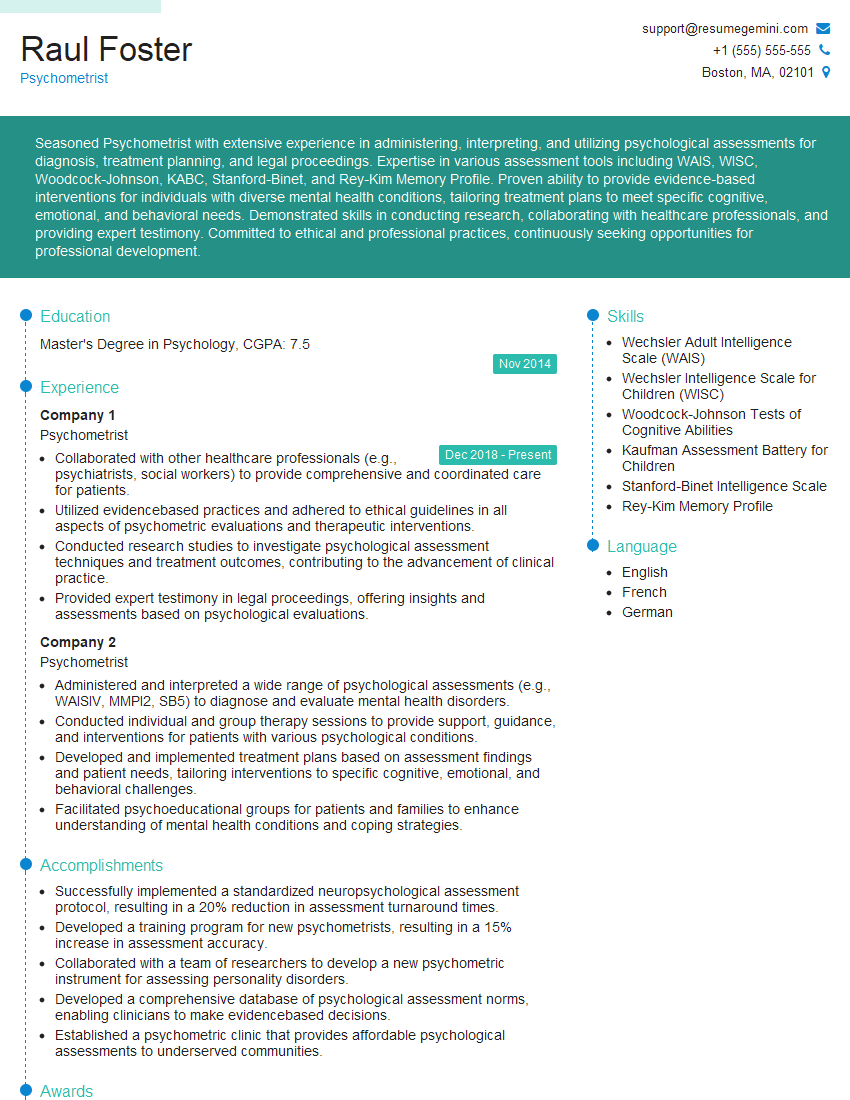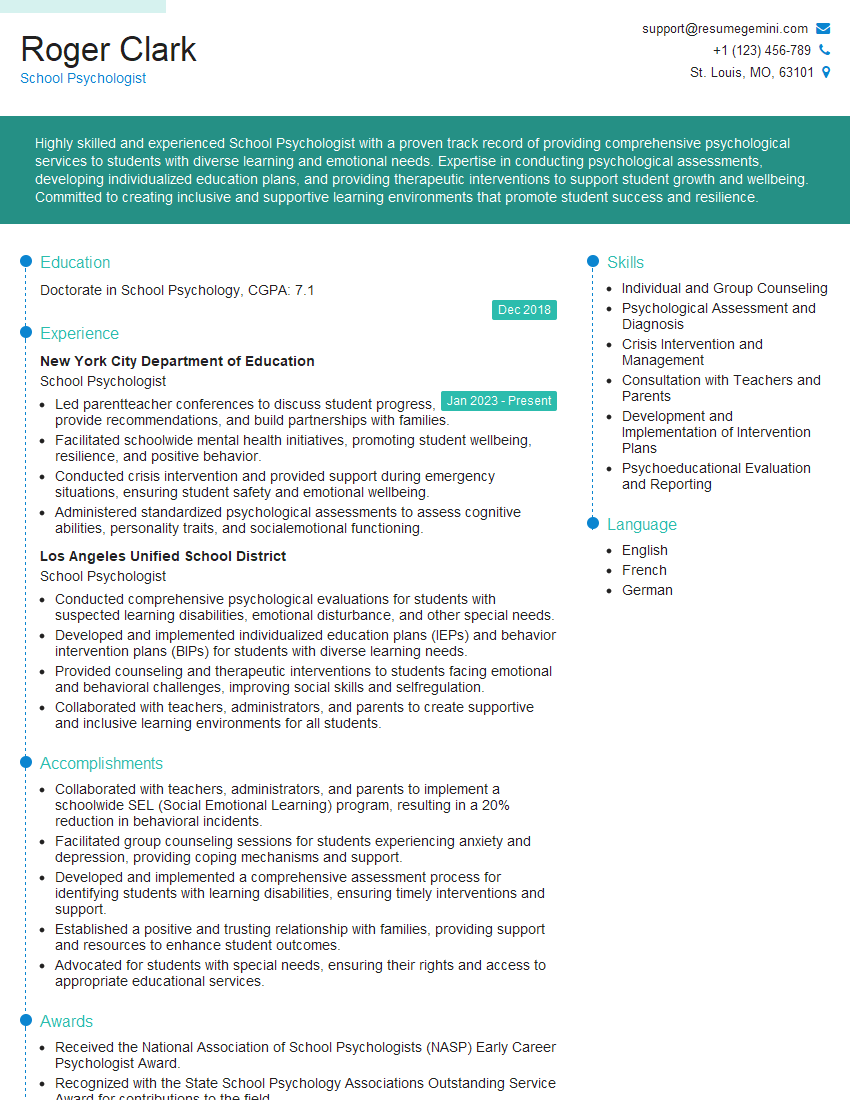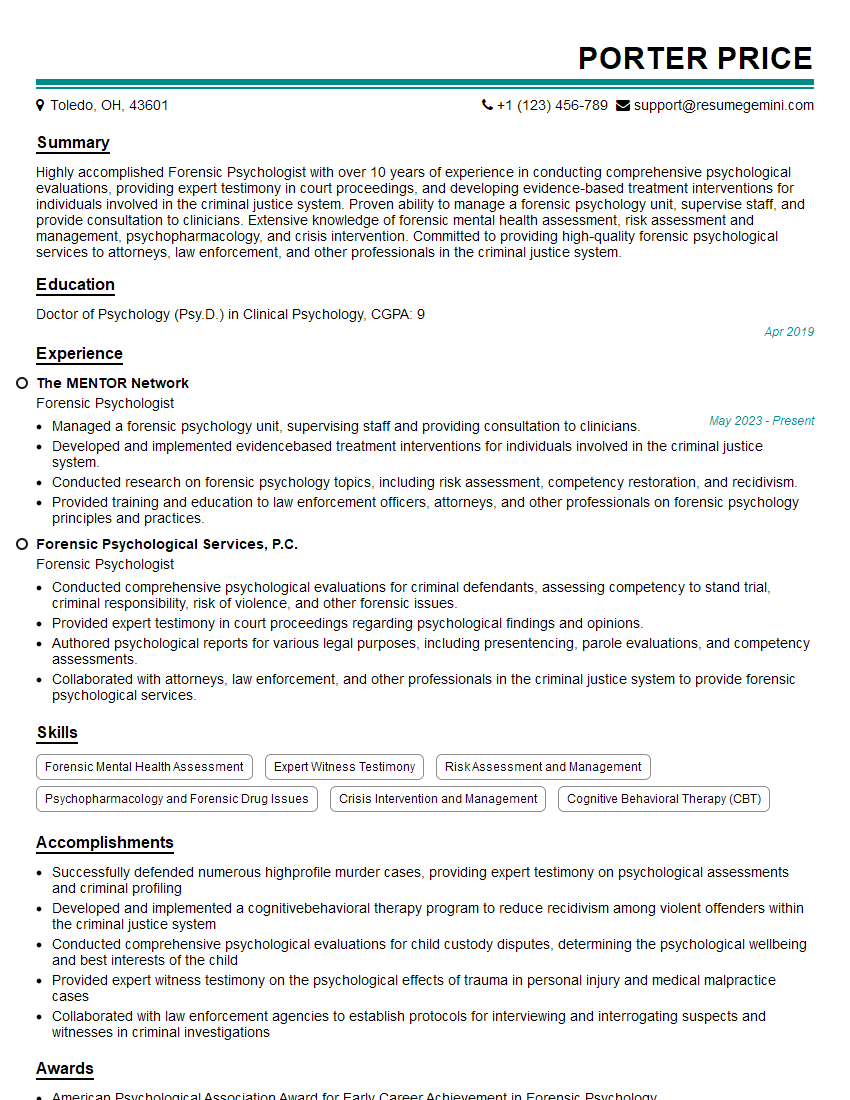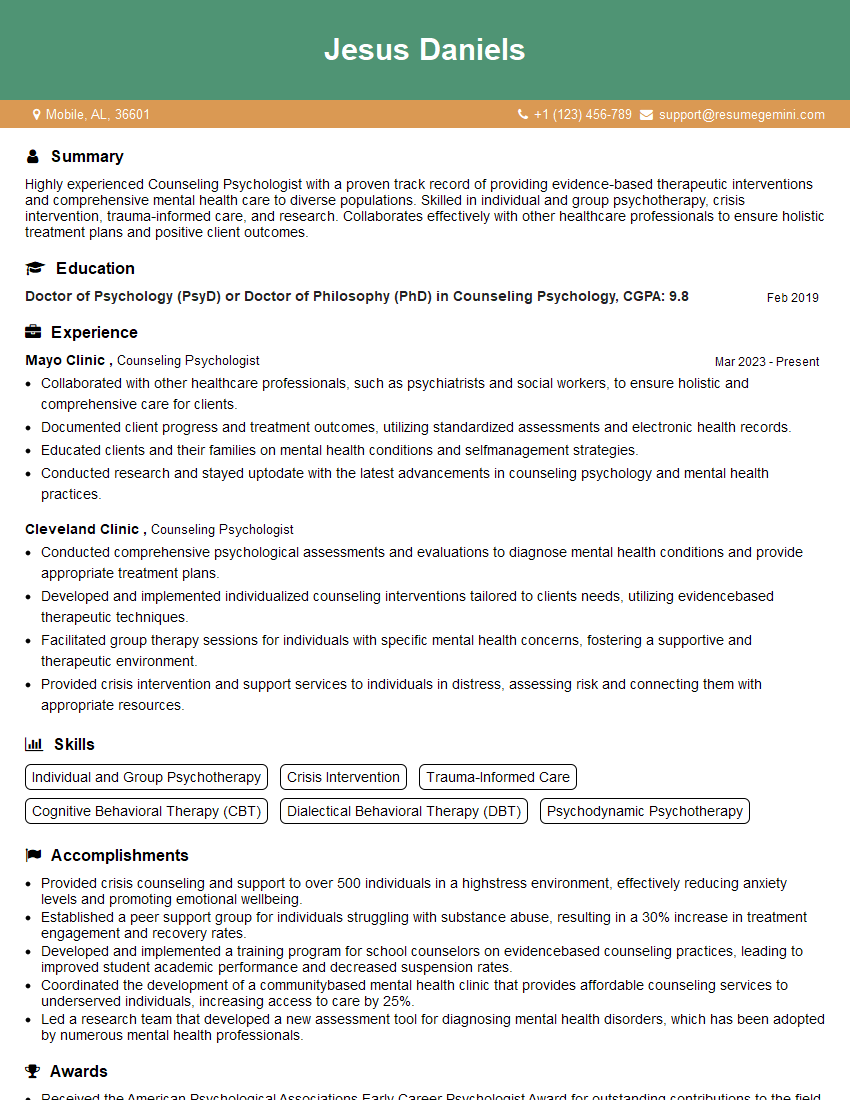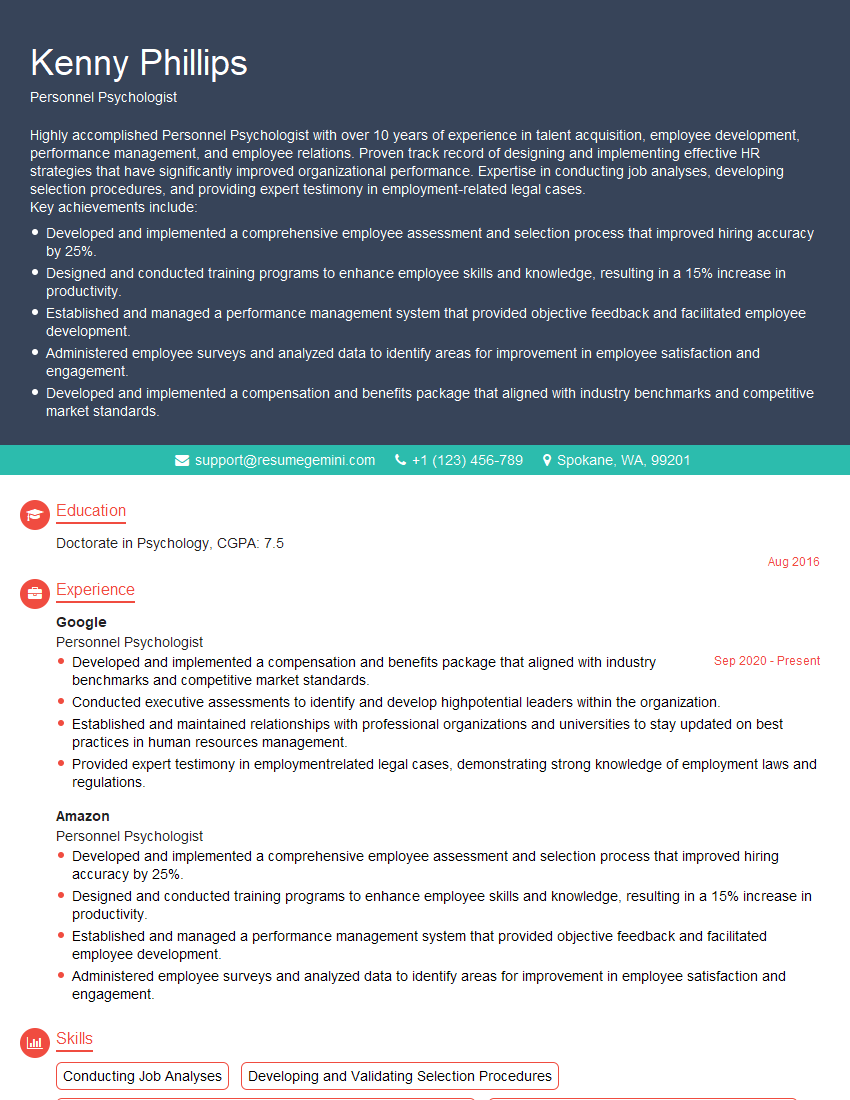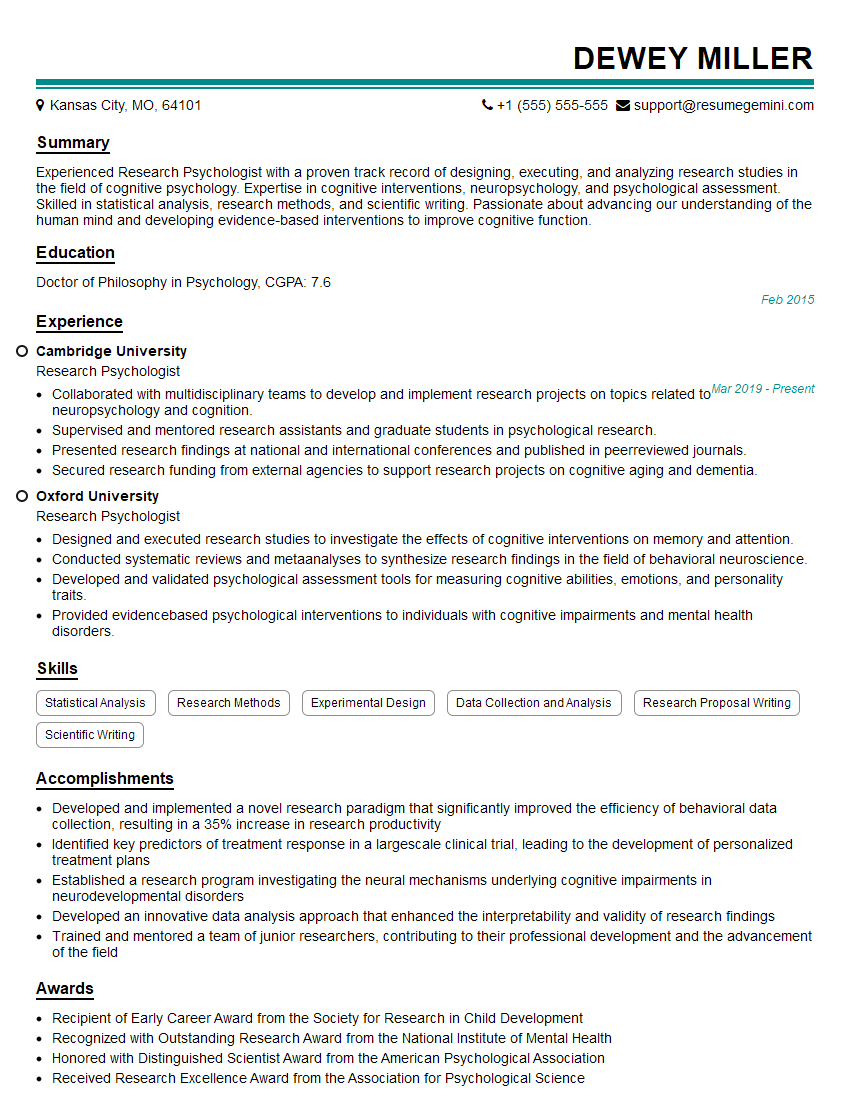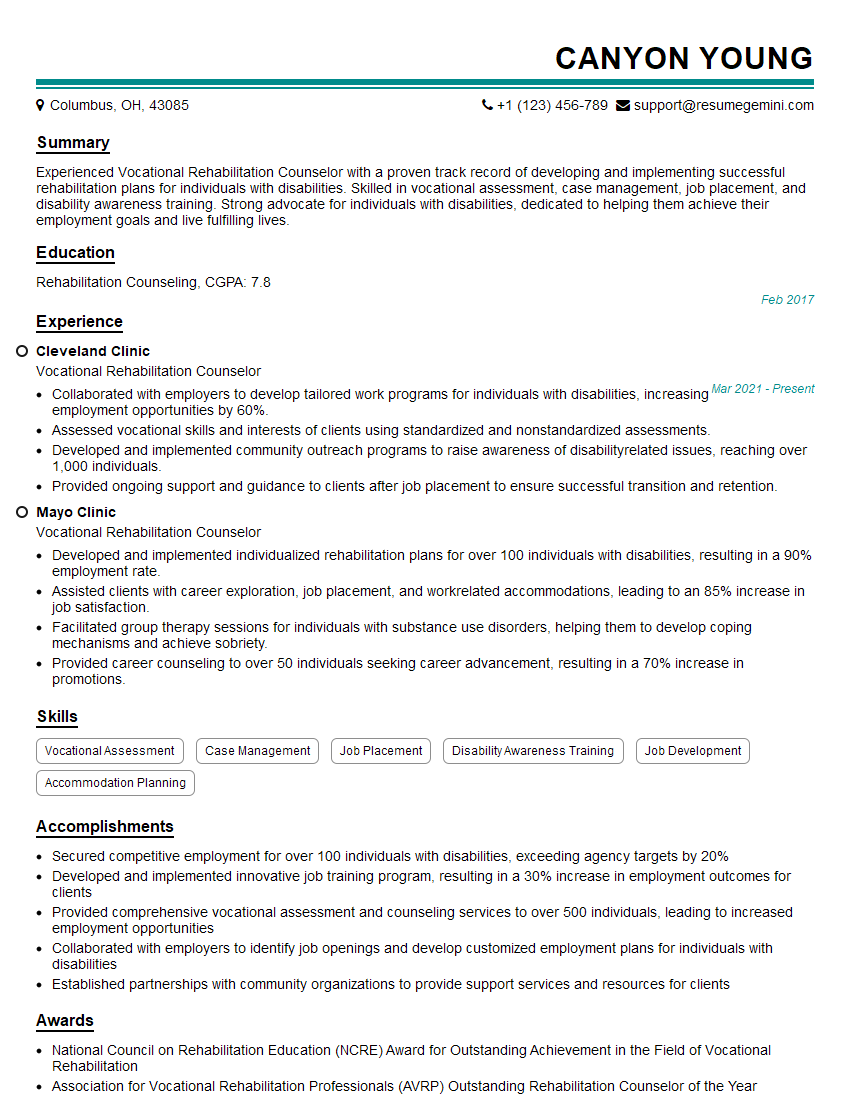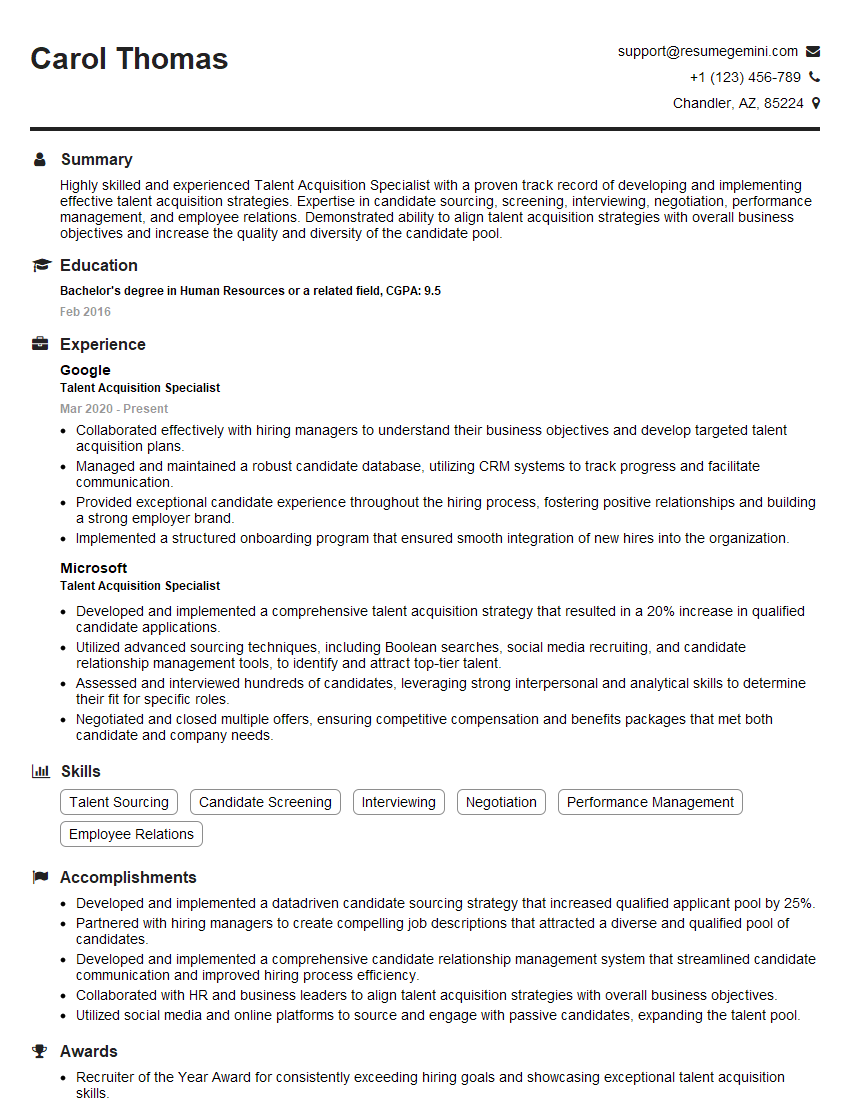Feeling uncertain about what to expect in your upcoming interview? We’ve got you covered! This blog highlights the most important Proficiency with Psychological Testing Software (e.g., Q-global, IntelliMetric) interview questions and provides actionable advice to help you stand out as the ideal candidate. Let’s pave the way for your success.
Questions Asked in Proficiency with Psychological Testing Software (e.g., Q-global, IntelliMetric) Interview
Q 1. What are the key differences between Q-global and IntelliMetric?
Both Q-global and IntelliMetric are popular platforms for administering and interpreting psychological assessments, but they differ in their features and focus. Q-global, offered by Pearson, is a broader platform encompassing a wider range of assessments, including cognitive, achievement, and personality tests. It’s known for its robust reporting features and integration with other assessment management systems. IntelliMetric, on the other hand, specializes in personality assessments, particularly focusing on instruments like the Hogan Personality Inventory (HPI). While it provides comprehensive reporting, its primary focus is on providing insights for organizational applications like talent management and leadership development. Think of it this way: Q-global is like a large department store with various assessment tools, while IntelliMetric is a boutique specializing in a particular type of assessment—personality.
In short: Q-global offers a wider array of tests and integrates with various systems, whereas IntelliMetric focuses specifically on personality assessments and their application in organizational settings.
Q 2. Explain the process of administering and scoring a personality assessment using Q-global.
Administering a personality assessment using Q-global involves several steps. First, you select the appropriate assessment from the platform’s library, considering the client’s needs and the purpose of the assessment. Next, you create a test profile for the individual, ensuring accurate demographic information is entered. This is crucial for accurate interpretation and reporting. The assessment is then administered, either online or through a paper-and-pencil method, depending on the test and the client’s preference. The platform often facilitates online delivery, providing a secure and convenient method for both the administrator and test-taker.
Once the assessment is completed, Q-global automatically scores the responses. The platform uses sophisticated algorithms to analyze the data and generate a comprehensive report, which usually includes scale scores, percentile ranks, and interpretive statements. This report is crucial because it helps us understand the individual’s personality traits and how they might influence their behavior in different contexts. For example, a high score in conscientiousness might indicate strong organizational skills and reliability, while a high score in extraversion could suggest a preference for social interaction and teamwork.
Finally, you review the generated report, considering the individual’s background and context before generating a final interpretation. It is crucial to avoid relying solely on the numbers; the overall interpretation should be guided by a deeper understanding of the individual and the situation.
Q 3. How do you ensure the confidentiality and security of test data in IntelliMetric?
IntelliMetric prioritizes data security and confidentiality through several key measures. The platform employs robust encryption protocols to protect data both in transit and at rest. Access to test data is strictly controlled through role-based permissions; only authorized personnel can access the information. The platform also typically adheres to relevant data privacy regulations such as HIPAA (in the US) or GDPR (in Europe), ensuring that all data handling practices are compliant. Data is often anonymized where appropriate, further safeguarding the individual’s privacy. Regular security audits and penetration testing are conducted to identify and address potential vulnerabilities. In addition, IntelliMetric often provides detailed audit trails which track who accessed and modified data at what time, ensuring accountability and the ability to investigate potential breaches.
Imagine it like a high-security vault: multiple layers of protection, strict access controls, and regular inspections ensure only authorized individuals can access the valuable information stored inside.
Q 4. Describe your experience interpreting assessment reports generated by Q-global or IntelliMetric.
My experience interpreting reports generated by both Q-global and IntelliMetric involves carefully considering the context of the assessment. I don’t simply look at the raw scores; I integrate the numerical data with qualitative information obtained through other means, like interviews or observations. For example, I once used the HPI (via IntelliMetric) to assess leadership potential in a candidate. While the report indicated high scores in assertiveness and ambition, which can be positive for leadership, a subsequent interview revealed a tendency towards aggression. This additional information helped me contextualize the numerical data and gave a more nuanced understanding of the candidate’s leadership potential.
I also pay close attention to the patterns and relationships between different scales within the report. Are there any inconsistencies? Do certain scores support or contradict others? This integrative approach is critical to avoid misinterpretations. For instance, a high score in neuroticism combined with low scores in stress tolerance might suggest a greater vulnerability to workplace stress. In summary, my interpretations are based on a holistic understanding, going beyond the numbers and incorporating contextual information for a more accurate and comprehensive profile.
Q 5. What are some common biases in psychological testing, and how do you mitigate them?
Several biases can affect psychological testing. Response bias occurs when test-takers respond in ways that don’t accurately reflect their true traits (e.g., social desirability bias, where individuals answer in a way they perceive as socially acceptable). Cultural bias arises when the test content or norms don’t account for the cultural background of the test-taker. Test administrator bias can also occur when an administrator’s behavior unconsciously influences the test-taker’s responses. Gender bias may exist where items are stereotypically associated with one gender over another.
To mitigate these biases, we use diverse samples in test development to create norms that are more representative of different populations. Using assessments with multiple item formats reduces the influence of response biases and ensuring the administrator is thoroughly trained and adheres to standardized procedures reduces administrator bias. Careful review of items and the test development process to ensure there is no inherent bias within the test question itself is extremely important in mitigating bias related to gender or culture.
Q 6. How do you handle situations where a test-taker refuses to complete a section of the assessment?
If a test-taker refuses to complete a section of the assessment, I first attempt to understand the reason behind their refusal. Sometimes it’s due to anxiety, fatigue, or a misunderstanding of the instructions. I would address this with patience and reassurance. I might offer a break if needed, or clarify any points of confusion. If the refusal is based on a strong objection to a particular question, I may note this in my report and discuss the implications of incomplete data in my interpretation. However, it’s crucial to balance the need for complete data with the test-taker’s autonomy and comfort. In some cases, partial data can still provide valuable insights, while in others, it might necessitate the use of alternative assessment methods.
The important point is to document the situation thoroughly and ensure that any limitations imposed by incomplete data are clearly stated in the final report.
Q 7. What are the ethical considerations in using psychological testing software?
Ethical considerations in using psychological testing software are paramount. Informed consent is essential—test-takers must understand the purpose of the assessment, how the data will be used, and their right to withdraw at any time. Confidentiality must be maintained rigorously, ensuring data security and protecting the privacy of test-takers. Competence is critical; only qualified professionals with the appropriate training and experience should administer and interpret these assessments. Test security is crucial to maintain the validity and reliability of the assessments, preventing unauthorized access and misuse. Finally, cultural sensitivity and awareness of potential biases are crucial in selecting and interpreting assessment results to prevent misinterpretations and ensure fair and equitable treatment for all.
Using this software responsibly ensures ethical and legal compliance, maintains the integrity of the assessment process, and protects the rights and well-being of the individuals being assessed.
Q 8. Explain the concept of test validity and reliability, and how they apply to Q-global/IntelliMetric assessments.
Test validity refers to how well a test measures what it claims to measure, while reliability refers to the consistency of the test’s results over time and across different administrations. In the context of Q-global and IntelliMetric assessments, validity is crucial to ensure that the scores accurately reflect the candidates’ abilities and traits relevant to the job. For example, a cognitive ability test claiming to measure problem-solving skills should actually be a good predictor of on-the-job problem-solving performance. Reliability ensures that a candidate who takes the test multiple times gets consistent scores, minimizing random error. Q-global and IntelliMetric employ rigorous validation studies to ensure both. They use statistical methods such as correlational analysis and factor analysis to demonstrate the validity of their tests against established criteria, and measures like Cronbach’s alpha to demonstrate internal consistency reliability. A low reliability score would mean the test is producing inconsistent results, making it unsuitable for decision-making.
Imagine trying to weigh apples on a scale that sometimes gives wildly different readings. That’s an unreliable scale, much like a test with low reliability. A valid test, on the other hand, is like a precise measuring tool that correctly assesses what it sets out to measure, providing consistent and accurate results.
Q 9. How do you choose the appropriate assessment for a given job or situation?
Choosing the right assessment is a critical step. It requires a thorough understanding of the job requirements, the skills and competencies needed for success, and the organizational context. I begin by conducting a job analysis, identifying the key tasks, responsibilities, and necessary skills. This informs the selection of assessments that target those specific skills. For instance, if a job requires strong analytical and problem-solving skills, a cognitive ability test from Q-global or IntelliMetric’s equivalent might be appropriate. If teamwork and communication are crucial, a personality assessment may be a better fit. I also consider the applicant pool, the organization’s culture, and the legal implications of the assessment choice to ensure compliance with equal employment opportunity regulations. Sometimes a combination of assessments is necessary to get a comprehensive picture of the candidate.
For example, I might use a cognitive ability test alongside a situational judgment test to evaluate a candidate’s decision-making skills in realistic work scenarios. The key is to select assessments that provide valid and reliable data that is relevant, fair and defensible.
Q 10. Describe your experience with different types of psychological assessments (e.g., cognitive, personality, aptitude).
My experience encompasses a wide range of psychological assessments. I’ve extensively used cognitive ability tests (like those available on Q-global and IntelliMetric) to assess general mental ability, including reasoning, problem-solving, and verbal and numerical comprehension. These are often used for selection in roles demanding high intellectual capabilities. I’m also proficient with personality assessments, such as those measuring the Big Five personality traits (openness, conscientiousness, extraversion, agreeableness, and neuroticism). These assessments help to understand individuals’ work styles, interpersonal skills, and emotional intelligence. Finally, I’ve utilized aptitude tests to assess specific skills, such as mechanical aptitude or clerical aptitude, helping to match individuals to roles aligning with their inherent capabilities. My experience includes utilizing different formats – computer-based testing, paper-and-pencil, and even adaptive assessments, adjusting difficulty based on the candidate’s responses.
For example, In one project, I used a combination of a cognitive ability test and a personality inventory to select managers. The cognitive test helped identify candidates with the intellectual capacity for strategic thinking, while the personality assessment ensured the selected individuals possessed the necessary leadership traits like emotional intelligence and teamwork skills.
Q 11. How do you ensure the assessments are culturally fair and unbiased?
Ensuring cultural fairness and eliminating bias is paramount. I use several strategies. First, I carefully review the psychometric properties of each assessment, examining its validation studies to ensure that it has been tested for bias across different demographic groups. Q-global and IntelliMetric generally provide data on this. Second, I ensure the assessment materials (instructions, questions, etc.) are clear, concise, and easily understood by individuals from diverse linguistic and cultural backgrounds. I may consult with subject matter experts to ensure wording avoids cultural assumptions or biases. Third, I might use strategies like creating norms for various demographic groups which allows for more appropriate comparisons. Finally, I constantly remain updated on best practices and evolving regulations regarding fair assessment practices and regularly review the assessments for any unintended biases that may have emerged.
If a bias is identified, I might need to adapt the assessment process or find alternative assessment methods that are more culturally fair. For example, If certain test items disproportionately disadvantage a particular ethnic group, those items may need to be removed or modified, ensuring fair and accurate evaluation for all candidates.
Q 12. How do you interpret and communicate assessment results to stakeholders (e.g., hiring managers, clients)?
Interpreting and communicating assessment results requires careful consideration. I avoid using technical jargon and translate complex statistical data into simple, understandable terms for stakeholders. For hiring managers, I focus on the implications for job performance. I might present scores relative to benchmarks, highlighting strengths and areas for development. I may also provide examples from the assessment data to illustrate a candidate’s abilities or potential challenges. For clients, I tailor my communication based on their level of understanding and the overall context. I always emphasize the limitations of any assessment, explaining that the results are one piece of information within a broader selection process. I often combine assessment results with other information such as interviews and references to create a holistic view of the candidate.
For example, rather than saying, “The candidate scored in the 80th percentile on the cognitive ability test,” I might say, “The candidate demonstrated excellent problem-solving skills, as evidenced by their performance on complex reasoning tasks in the assessment.” Clear, concise communication is crucial for building trust and ensuring that stakeholders understand and utilize the data effectively.
Q 13. How do you utilize data from Q-global or IntelliMetric to inform hiring decisions?
Data from Q-global and IntelliMetric inform hiring decisions by providing objective, data-driven insights into candidate capabilities. I use the assessment results to identify candidates who possess the required skills and competencies for a specific role. I don’t rely solely on assessment scores; rather, I use these scores in conjunction with other data points such as resumes, interviews, and reference checks. For example, a candidate might score highly on a cognitive ability test, but perform poorly in a situational judgment test, suggesting a mismatch between their intellectual capacity and practical application of their skills. Analyzing this combined data helps in a more nuanced and informed decision-making process. I also track the performance of candidates hired based on the assessment results, assessing the predictive validity of the assessments and allowing for continuous improvement in our selection strategies.
Essentially, Q-global and IntelliMetric provide a structured approach to evaluating candidates, ensuring fairness, consistency and a degree of objectivity in the recruitment process.
Q 14. What is your experience with different assessment platforms similar to Q-global and IntelliMetric?
Besides Q-global and IntelliMetric, I have experience with several other assessment platforms. These include [mention specific platforms, e.g., SHL, Kenexa, Talent Q]. Each platform has its strengths and weaknesses in terms of the types of assessments offered, the user interface, reporting features, and the level of technical support provided. My experience working with different platforms has broadened my understanding of various assessment methodologies and allowed me to tailor my approach based on the specific needs of the client and the nature of the job requirements. The core principles of test validity and reliability, cultural fairness, and appropriate interpretation remain consistent across all platforms, although the specific metrics and reporting styles might differ.
The advantage of having experience with multiple platforms is that I can choose the best tool for the specific situation, whether it’s the breadth of assessments, ease of integration with existing systems, or the platform’s specific strengths in a particular assessment area.
Q 15. Describe a situation where you had to troubleshoot a technical issue with psychological testing software.
One time, during a large-scale recruitment drive using Q-global, we encountered an issue where test results weren’t being properly uploaded to the central database. Some candidates’ profiles showed incomplete data, leading to potential biases in our selection process. My troubleshooting involved several steps. First, I checked the software’s logs for error messages, pinpointing the problem to a network connectivity issue between the testing computers and the server. This was further confirmed by the intermittent nature of the errors. Second, I verified the network configuration, confirming firewall settings weren’t blocking the required ports. This included checking IP addresses and DNS settings to make sure everything was correctly communicating. Finally, after temporarily disabling the firewall to isolate the problem and confirming it was the root cause, we worked with our IT team to properly configure the firewall to allow the necessary communication while maintaining security. The issue was resolved by whitelisting the specific ports used by Q-global on the firewall, allowing data transfer to resume smoothly. This highlighted the importance of understanding not only the software itself but also the supporting infrastructure.
Career Expert Tips:
- Ace those interviews! Prepare effectively by reviewing the Top 50 Most Common Interview Questions on ResumeGemini.
- Navigate your job search with confidence! Explore a wide range of Career Tips on ResumeGemini. Learn about common challenges and recommendations to overcome them.
- Craft the perfect resume! Master the Art of Resume Writing with ResumeGemini’s guide. Showcase your unique qualifications and achievements effectively.
- Don’t miss out on holiday savings! Build your dream resume with ResumeGemini’s ATS optimized templates.
Q 16. How do you stay current with the latest advancements in psychological testing and assessment technology?
Staying up-to-date in this rapidly evolving field is crucial. I achieve this through a multi-pronged approach. Firstly, I actively participate in professional development workshops and conferences focused on psychometrics and assessment technology. These events provide valuable insights into the newest software updates, best practices, and emerging trends. Secondly, I subscribe to relevant professional journals and online resources like the publications of the American Psychological Association (APA) and the Society for Industrial and Organizational Psychology (SIOP). These publications provide in-depth research on assessment methods and tools. Thirdly, I actively engage in online communities and forums for professionals in the field. This allows for direct knowledge exchange and collaboration with leading experts. Finally, I regularly review updates and documentation provided by the vendors of the psychological testing software I use, such as Q-global and IntelliMetric, to ensure I’m using the most current versions and understanding any changes or enhancements.
Q 17. What are the limitations of using psychological testing software?
While psychological testing software offers significant advantages in terms of efficiency and standardization, it’s crucial to acknowledge its limitations. One major constraint is the potential for bias in the algorithms used by the software. If the data used to train the algorithm isn’t representative of the population being assessed, the results may reflect pre-existing societal biases. For example, if an algorithm is trained on data primarily from a certain demographic group, it might unfairly disadvantage candidates from other groups. Additionally, the software’s reliance on structured questions and responses can limit its ability to capture the nuances of human behavior and personality, potentially leading to an incomplete picture of the candidate. Contextual factors and individual circumstances often cannot be adequately assessed through standardized testing. Finally, issues of test security and data privacy must be carefully managed. The software should incorporate robust security features to prevent unauthorized access and protect sensitive candidate information.
Q 18. How do you address concerns about the use of algorithms in hiring decisions?
Concerns about algorithms in hiring are valid and need careful consideration. My approach is centered on transparency and fairness. First, I emphasize that these algorithms should be treated as tools, not as decision-makers. They can provide valuable data, but human judgment and interpretation are essential. Second, I advocate for thorough validation and auditing of the algorithms themselves. It’s critical to ensure that the algorithms are free of bias and that their predictive validity is demonstrably strong. Third, I promote the use of multiple assessment methods to get a holistic picture of candidates. Relying solely on algorithmic assessments can lead to a narrow and potentially inaccurate view of their abilities and potential. Finally, it’s crucial to explain the process and results transparently to candidates. This builds trust and ensures fairness. Clear communication is key to managing and mitigating concerns. A good practice is to provide candidates with an explanation of how the algorithm factors into the hiring decision and an opportunity to review and address any concerns.
Q 19. Describe your experience with data analysis related to psychological assessments.
My experience with data analysis in psychological assessments involves a range of techniques. I’m proficient in using statistical software packages such as SPSS and R to analyze data from various psychological tests. This includes conducting descriptive statistics to summarize the data, performing reliability and validity analyses to evaluate the quality of the assessment, and running inferential statistical tests to compare groups or identify predictors of success. For example, in a recent project using IntelliMetric data, I conducted factor analysis to examine the underlying structure of personality traits measured by the test. This allowed us to identify patterns of correlation among the items and to determine whether the test was measuring the constructs it was intended to measure. I also have experience visualizing data using various charting tools to present the results effectively to stakeholders. This allows for a clear understanding of patterns and trends in the data which can be used to refine the talent acquisition process.
Q 20. How do you integrate psychological assessment findings with other data sources in talent selection?
Integrating psychological assessment findings with other data sources is crucial for a comprehensive talent selection process. This involves a multi-step approach. First, we collect data from multiple sources such as resumes, application forms, interviews, references, and work samples. Second, we use a structured approach to analyze this data, assigning weights to different data points depending on their relevance and reliability. Third, we integrate the findings from psychological assessments, such as personality tests and cognitive ability tests, into this broader data picture. This involves comparing the results across different data sources to identify patterns and inconsistencies. For example, a candidate might score high on a personality test for conscientiousness, but their references might suggest a lack of attention to detail. This discrepancy requires further investigation. Finally, we use this integrated data to inform our hiring decisions, making sure to avoid overreliance on any single data source. We use this integrated approach to build a more nuanced and comprehensive understanding of each candidate.
Q 21. How do you ensure the legal compliance of using psychological testing software?
Legal compliance is paramount when using psychological testing software. My approach centers around several key areas. First, I ensure that the tests used are valid and reliable for the specific purpose they’re intended for. This often involves reviewing the technical manuals and research supporting the tests, and being aware of best practice guidelines from bodies such as the APA and BPS (British Psychological Society). Second, I adhere strictly to data privacy regulations such as GDPR and CCPA, ensuring that candidate data is stored securely and handled responsibly, always in accordance with the latest legal mandates. Third, I obtain informed consent from candidates before administering any tests, fully explaining the purpose of the assessment, how the data will be used, and their rights regarding their data. Finally, I maintain thorough documentation of all testing procedures and results. This documentation serves as a record of compliance and provides transparency throughout the process. Regular updates on legal changes and best practices ensure continued adherence to standards.
Q 22. What measures do you take to prevent test fraud and ensure test integrity?
Maintaining test integrity is paramount. My approach is multi-faceted, focusing on prevention and detection. Firstly, I rigorously adhere to all publisher guidelines regarding test security, including secure storage of test materials, controlled access to testing environments, and the use of proctoring where necessary. This might involve using online proctoring tools integrated with Q-global or IntelliMetric, or implementing strict protocols for in-person testing, such as limiting access to test materials and employing observation techniques.
Secondly, I employ various methods to detect potential fraud. This includes analyzing response patterns within the software for inconsistencies indicative of cheating (e.g., unusually fast response times combined with low accuracy). Q-global and IntelliMetric offer some built-in functionalities for this type of analysis. I also carefully review individual test results for any anomalies that raise suspicion. For example, a significant discrepancy between performance on different sections of a test, or a pattern of responses consistent with coaching or access to test materials, would trigger a further investigation. In cases of suspected fraud, I always document my findings thoroughly and follow established protocols for reporting and resolving such issues.
Finally, educating test-takers about the importance of test integrity is crucial. Providing clear instructions and emphasizing the consequences of cheating helps foster a culture of honesty and fair assessment.
Q 23. How familiar are you with the different reporting features within Q-global and IntelliMetric?
I’m highly familiar with the reporting features of both Q-global and IntelliMetric. Both platforms offer a rich array of reporting options, ranging from simple score reports to detailed normative and ipsative comparisons. In Q-global, I frequently utilize the customizable report builder to create tailored reports that highlight specific aspects relevant to the client’s needs, such as percentile ranks, standard scores, and detailed subscales. For example, for a client interested in hiring for a leadership position, I would create a report that emphasizes scores related to leadership skills and emotional intelligence, while downplaying scores that are less relevant.
IntelliMetric provides excellent visualizations, including graphs and charts, which are especially useful for illustrating trends and patterns in assessment data. I’m particularly adept at generating reports that compare an individual’s performance against different norms (e.g., age norms, gender norms), providing a more nuanced understanding of their results. Both systems allow for exporting reports in various formats (PDF, Excel, etc.), making it easy to integrate the data into other systems for further analysis.
Q 24. Describe your experience customizing assessments using Q-global or IntelliMetric.
Customizing assessments is a regular part of my workflow. Both Q-global and IntelliMetric allow for a degree of customization, though the extent varies depending on the specific assessment. For instance, in Q-global, I frequently tailor reports to emphasize specific scales or subscales. For example, if I’m assessing candidates for a technical role, I can create a report that prominently features scores related to problem-solving and analytical abilities.
In IntelliMetric, I’ve worked with creating custom scoring algorithms for specific clients. This often involves using the system’s programming functionalities (where applicable) to weight different items based on their importance for a particular job role. For example, for a sales role, I might adjust the weighting of items related to interpersonal skills and sales aptitude, giving them more significance in the overall score. This allows for a more targeted assessment that aligns perfectly with the specific requirements of the job.
Q 25. How do you explain complex assessment results to individuals with limited psychological knowledge?
Explaining complex assessment results to individuals without a psychology background requires clear, concise communication and avoiding jargon. I start by providing a general overview of the purpose of the assessment and what it measures. Then, I focus on explaining the key findings in simple terms, using analogies and real-world examples. Instead of saying “your score on the conscientiousness scale is in the 75th percentile,” I might say, “this suggests that you’re generally very organized and dependable, which is a valuable asset in many workplaces.”
Visual aids like charts and graphs can significantly enhance understanding. I will often use the report generation features of Q-global and IntelliMetric to create simplified visualizations of their results. I also ensure plenty of time for questions and answers, encouraging the individual to express their understanding or any concerns they may have. The key is to make the explanation relevant and meaningful to their personal context, fostering a collaborative discussion rather than a one-sided explanation.
Q 26. What is your approach to managing multiple assessments simultaneously within the software?
Managing multiple assessments simultaneously requires a structured approach. I utilize the organizational features within Q-global and IntelliMetric to create separate projects or folders for each assessment. This allows me to keep track of different clients, candidates, and assessments easily. Within each project, I meticulously label and organize all files and data. I also leverage the software’s search and filter functionalities to quickly locate specific information when needed.
Furthermore, I create detailed schedules and timelines to track progress on each assessment, ensuring timely completion of all tasks. A well-organized workflow is crucial to prevent errors and maintain accuracy. I also utilize task management tools, both within and outside of the assessment software, to ensure efficient progress monitoring across all ongoing assessments.
Q 27. How do you use the data generated by the software to improve the hiring process?
The data generated by Q-global and IntelliMetric significantly improves the hiring process by providing objective insights into candidates’ abilities and personality traits. By combining assessment data with other information such as resumes and interview notes, I can create a more holistic picture of each candidate. This helps in identifying candidates who not only possess the necessary technical skills but also demonstrate the behavioral competencies needed to succeed in a specific role.
For instance, by analyzing scores related to teamwork and communication, I can identify candidates who are likely to collaborate effectively within a team. Similarly, by examining scores related to stress tolerance and resilience, I can assess a candidate’s ability to handle pressure and challenges. This data-driven approach reduces reliance on subjective biases during the hiring process, leading to more informed and effective hiring decisions.
Q 28. What are your strategies for ensuring accurate and efficient data entry within the software?
Accurate and efficient data entry is crucial. My strategies involve multiple layers of quality control. First, I use double-data entry methods whenever possible. This involves entering the data twice, and then using the software’s comparison tools to identify any discrepancies. Secondly, I thoroughly review all data entry before proceeding to analysis. This involves verifying the accuracy of the data against the original source documents, such as application forms or test answer sheets. I always maintain a detailed audit trail of all data entry processes, documenting any changes or corrections made.
I also utilize the software’s data validation features to ensure data integrity. For example, I use range checks to make sure that scores fall within the acceptable range, and I use data type checks to ensure that the data is entered in the correct format. By adopting these strategies, I ensure the accuracy and reliability of the data generated by the software, improving the overall quality of assessment results.
Key Topics to Learn for Proficiency with Psychological Testing Software (e.g., Q-global, IntelliMetric) Interview
- Test Administration and Scoring: Understand the procedures for administering various psychological tests within Q-global or IntelliMetric, including proper test setup, instructions to test-takers, and accurate scoring methodologies. Consider the ethical implications of each step.
- Report Interpretation: Go beyond simply generating reports. Learn to critically analyze the data presented, identify key findings, and translate these into actionable insights relevant to the client or situation. Practice synthesizing information from different test sections.
- Software Navigation and Functionality: Demonstrate mastery of the software interface, including data entry, report generation, and data management features. Be prepared to discuss different functionalities and their practical applications within the context of various assessments.
- Data Security and Confidentiality: Understand and articulate the importance of maintaining client confidentiality and adhering to data security protocols within the software and in general practice. Be familiar with relevant regulations and ethical guidelines.
- Test Selection and Appropriateness: Discuss factors influencing test selection (e.g., purpose of assessment, client characteristics, test validity and reliability). Explain the process of choosing the appropriate test based on specific assessment needs.
- Troubleshooting and Problem-Solving: Prepare for potential technical difficulties or errors encountered during test administration or report generation. Be ready to explain your approach to resolving such issues efficiently.
- Theoretical Foundations: Demonstrate a solid understanding of the underlying psychological principles and theories that inform the use of these testing platforms. Be prepared to discuss the psychometric properties of different tests.
Next Steps
Mastering proficiency with psychological testing software like Q-global and IntelliMetric is crucial for career advancement in fields such as HR, education, and clinical psychology. It demonstrates a commitment to professional development and showcases your ability to leverage technology for accurate and efficient assessments. To significantly boost your job prospects, focus on creating an ATS-friendly resume that highlights your skills and experience effectively. ResumeGemini is a trusted resource that can help you craft a compelling resume tailored to the specific requirements of these roles. We provide examples of resumes specifically designed for professionals proficient in Q-global and IntelliMetric to guide you in showcasing your expertise.
Explore more articles
Users Rating of Our Blogs
Share Your Experience
We value your feedback! Please rate our content and share your thoughts (optional).
What Readers Say About Our Blog
This was kind of a unique content I found around the specialized skills. Very helpful questions and good detailed answers.
Very Helpful blog, thank you Interviewgemini team.
